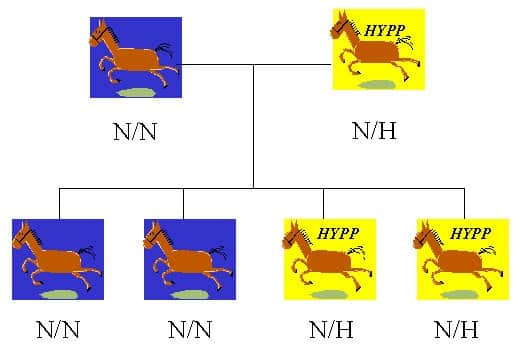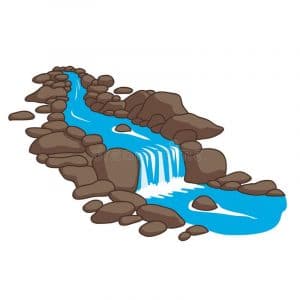 Diarrhea is a descriptive term that means that the horse’s manure is liquidy and runny (the word “diarrhea” actually comes from an old Greek word meaning, “to flow through,” which is pretty right on, as far as old Greek words go). For horse owners, it means, “I can’t believe he found something else to make me worry,” or something like that.
Diarrhea is a descriptive term that means that the horse’s manure is liquidy and runny (the word “diarrhea” actually comes from an old Greek word meaning, “to flow through,” which is pretty right on, as far as old Greek words go). For horse owners, it means, “I can’t believe he found something else to make me worry,” or something like that.
One of the things about which I am eternally grateful is that, relative to small animals, serious diarrhea in horses is a fairly uncommon problem. There are two main reasons for my gratitude. First of all, serious diarrhea in horses can be very difficult to treat. The second reason pertains to matters of scale. Otherwise stated, when a horse contracts a serious case of diarrhea, there’s a whole lot of liquid to deal with (and to try to avoid wearing). It’s messy. I go through a lot of clothes.
It’s also difficult for me to write an article about diarrhea in horses and keep things completely strait-laced. I will not be able to do so, so be forewarned. Medical humor is a survival mechanism, I think. Which leads to my first thought.
QUESTION: What’s the best thing to give a horse with diarrhea?
ANSWER: Plenty of room.
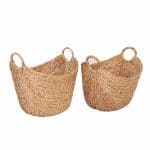 Anyway, in terms of talking about diarrhea (which is not, frankly, something that I’d suggest that you do at most dinner parties), I’d suggest that you put them into two large baskets. The first basket are the serious healthy problems that result in diarrhea (and colic and fever and laminitis and a whole bunch of other ugly stuff).
Anyway, in terms of talking about diarrhea (which is not, frankly, something that I’d suggest that you do at most dinner parties), I’d suggest that you put them into two large baskets. The first basket are the serious healthy problems that result in diarrhea (and colic and fever and laminitis and a whole bunch of other ugly stuff).
When trying to decide if a horse’s diarrhea problem is an immediate threat to his health, there are two primary features to consider. The first is the consistency of the horse’s manure. Is it like water pouring out of a pipe? Pipe-stream diarrhea is a real term and it’s usually not a good thing. The second feature to consider is the frequency. Is the horse constantly going to the bathroom or is does he just have watery poop on the occasions when he regularly poops? Is there just a bit of water coming out at the end of the pile of road apples? Is the pile of poop more like that of a cow (“cow-pie” diarrhea)? These are thing that the avid student of fecal consistency just has to know.
 Diarrhea is more likely to be immediately threatening to a horse’s health when the horse has both abnormal frequency and abnormal consistency of his feces. These horses (and foals) not only have diarrhea – lots and lots of fluid coming out of the rear end – but they also tend to be really sick. They have fevers, they feel terrible, they won’t eat, they get dehydrated (from painting the walls and/or pastures with all of that fluid), and I hope you never have to deal with such a case. These horses can be very difficult to treat, they require massive amounts of fluids, both orally and intravenously, and they are best dealt with in an equine hospital under the care of a very dedicated veterinarian with access to a shower and lots of clean clothes. These are serious medical problems, sometimes caused by contagious bacteria (such as Salmonella sp.). If your horse looks and acts really sick and the manure won’t stop flowing, whether it’s an adult horse or a foal, you probably need to get some help, and soon.
Diarrhea is more likely to be immediately threatening to a horse’s health when the horse has both abnormal frequency and abnormal consistency of his feces. These horses (and foals) not only have diarrhea – lots and lots of fluid coming out of the rear end – but they also tend to be really sick. They have fevers, they feel terrible, they won’t eat, they get dehydrated (from painting the walls and/or pastures with all of that fluid), and I hope you never have to deal with such a case. These horses can be very difficult to treat, they require massive amounts of fluids, both orally and intravenously, and they are best dealt with in an equine hospital under the care of a very dedicated veterinarian with access to a shower and lots of clean clothes. These are serious medical problems, sometimes caused by contagious bacteria (such as Salmonella sp.). If your horse looks and acts really sick and the manure won’t stop flowing, whether it’s an adult horse or a foal, you probably need to get some help, and soon.
 The more commonly seen horses are those that have abnormal consistency but normal frequency of defecation (the proper term for pooping). These horses may not show any signs of obvious illness, they just have loose, messy manure. And they can be a bit of a mystery.
The more commonly seen horses are those that have abnormal consistency but normal frequency of defecation (the proper term for pooping). These horses may not show any signs of obvious illness, they just have loose, messy manure. And they can be a bit of a mystery.
ASIDE: I’m sometimes asked if diarrhea in horses is a genetic problem. I tell them, “No.” However, what I want to tell them is that it doesn’t run in the family.
Anyway, let’s talk about a few of the more common causes of diarrhea in otherwise healthy adults and foals. First, the babies.
FOAL DIARRHEA
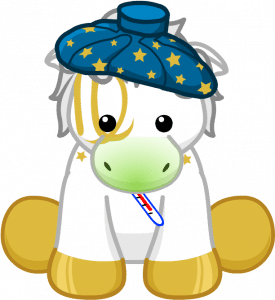 Diarrhea in foals has all sorts of causes; those causes can be hard to identify. One of the most common is so called “foal heat” diarrhea, which usually happens a week or so after the foal is born. Veterinarians used to attribute this to a parasite but now it’s considered that this is just due to normal changes inside the foal’s intestines. These babies are completely normal – it’s just that they’re messy. In fact, loose poop in foals can go on for a surprisingly long time – months – and not be a problem. It’s the same in human infants. Eventually, as the normal bacteria in the foal’s gut get established, they firm up. Otherwise stated, if they’re not obviously sick, loose poop in normal foals usually takes care of itself.
Diarrhea in foals has all sorts of causes; those causes can be hard to identify. One of the most common is so called “foal heat” diarrhea, which usually happens a week or so after the foal is born. Veterinarians used to attribute this to a parasite but now it’s considered that this is just due to normal changes inside the foal’s intestines. These babies are completely normal – it’s just that they’re messy. In fact, loose poop in foals can go on for a surprisingly long time – months – and not be a problem. It’s the same in human infants. Eventually, as the normal bacteria in the foal’s gut get established, they firm up. Otherwise stated, if they’re not obviously sick, loose poop in normal foals usually takes care of itself.
To prevent problems with diarrhea in foals, it’s important to make sure that they get plenty of colostrum: the mare’s first milk. Colostrum gives the foal a dose of immune factors and helps the horse fight off the bugs that it faces when it first hits the ground. When a foal is born, to prevent all sorts of problems, including diarrhea, make sure the baby is drinking and make sure that the mare’s udder is being sucked down. Also make sure that the foal gets born into a clean environment – this will help reduce exposure to diarrhea-causing bugs. (CLICK HERE FOR MY ARTICLE ON NEWBORN FOAL CARE.)
BOTTOM LINE: If a new foal isn’t drinking, has diarrhea, and is acting sick, call your veterinarian ASAP. The little guys can rapidly dehydrate due to all of the fluid loss out the rear end. It’s always better safe than sorry because when they’re sick, and foals with diarrhea can go downhill really fast. In otherwise healthy foals, you want to make sure that you do all of the things that you would normally do, of course: good nutrition, deworming as needed, etc. You might also have to put on your patience hat.
ADULT CAUSES OF NORMAL FREQUENCY/ABNORMAL CONSISTENCY PROBLEMS
ASIDE: What do you call it when a racehorse has diarrhea? The “trots.”
Manure that is less formed than expected is a fairly common problem in adult horses. These horses generally don’t act or seem sick, it’s just that they often have things like green stripes running down their back legs (which can be particularly upsetting to grey or palomino horse owners). Many of these horses don’t have an obvious cause for their problem, which means that a little trial and error may be in order. Here are a few of the ones that I’ve had to deal with over the years.
-

Not a good place to graze
SAND – This one’s kind of regional, but in places where the ground is sandy, aggressive eaters are only too happy to take in a mouthful of sand along with a blade of grass or leaf of hay. Eventually, if the horses eat and accumulate enough, they’ll colic when the intestines gets packed full of wet sand. But before that, their manure will usually start to get loose. That’s because sand irritates the intestines. When the intestines get irritated, they secrete water. So, if you’re in one of those places where sand accumulation is a problem, and your horse starts to develop a bit of diarrhea, make sure you check the feces for sand before it turns into a bigger problem
- STEM LENGTH IN THE HAY – I’m not sure if this one is in the textbooks anywhere, but a colleague turned me on to this, and I think it’s a real thing. It seems that when certain horses digest the long stems of hay, they also produce an excessive amount of water. These horses are otherwise healthy but their poop gets watery. For some of them, reducing the length of the fiber in their diet – for example, substituting processed hay pellets for hay – seems to do the trick. I don’t know why. It’s something to try.
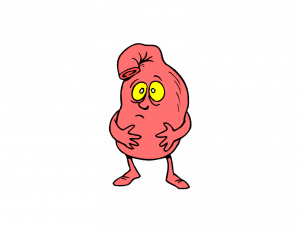 A CERTAIN TYPE OF HAY DOESN’T AGREE WITH THE HORSE – Given all of the interest in dietary allergies, especially in people and in dogs, it’s natural that people would jump to food allergies as a possible problem. The problem is that true food allergies are almost impossible to diagnose. In addition, just because a certain type of feed doesn’t agree with the horse doesn’t mean that he’s allergic to it. Of course, diarrhea isn’t the only sign – or even the most common sign – of a food allergy: itching, weight loss, and hives might be expected, as well. Unfortunately, if you’re thinking that the problem might be allergies, there are lots of tests (blood tests, skin tests, and such), but the test results often aren’t very useful. Nevertheless, the treatment of horses that get the runs from a particular type of feed is pretty much the same: choose a different feed. That said, eliminating various things from the horse’s diet and seeing what happens is time consuming, so don’t get frustrated. Diets that are high in fiber and high in fat tend not to cause problems for most horses, so you might want to think about starting there. It’s always a good idea to take notes and to work with your veterinarian, of course.
A CERTAIN TYPE OF HAY DOESN’T AGREE WITH THE HORSE – Given all of the interest in dietary allergies, especially in people and in dogs, it’s natural that people would jump to food allergies as a possible problem. The problem is that true food allergies are almost impossible to diagnose. In addition, just because a certain type of feed doesn’t agree with the horse doesn’t mean that he’s allergic to it. Of course, diarrhea isn’t the only sign – or even the most common sign – of a food allergy: itching, weight loss, and hives might be expected, as well. Unfortunately, if you’re thinking that the problem might be allergies, there are lots of tests (blood tests, skin tests, and such), but the test results often aren’t very useful. Nevertheless, the treatment of horses that get the runs from a particular type of feed is pretty much the same: choose a different feed. That said, eliminating various things from the horse’s diet and seeing what happens is time consuming, so don’t get frustrated. Diets that are high in fiber and high in fat tend not to cause problems for most horses, so you might want to think about starting there. It’s always a good idea to take notes and to work with your veterinarian, of course.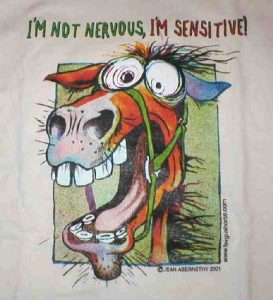 NERVOUSNESS – Sometimes horses get really nervous and, sometimes, nervous horses get runny manure. Anxiety is a known source of diarrhea in people – it can happen in horses, too. When they get over being nervous, say, after coming back home from a show, the diarrhea goes away.
NERVOUSNESS – Sometimes horses get really nervous and, sometimes, nervous horses get runny manure. Anxiety is a known source of diarrhea in people – it can happen in horses, too. When they get over being nervous, say, after coming back home from a show, the diarrhea goes away.- INTERNAL PARASITES – In my experience, a lot of people jump right to internal parasites as a cause of diarrhea. It’s certainly worth looking into – it’s also worth consulting with your veterinarian about which dewormer might be appropriate – but don’t be surprised if you deworm your runny horse and there’s no change.
- MEDICATIONS – Some medications, such as antibiotics, can cause diarrhea, which is one of the many reasons you don’t want to use medications indiscriminately.
- SOME ODD, CHRONIC DISEASES – Sometimes there are medical conditions that cause a horse to have diarrhea without also making him seriously ill. The list is long – suffice it to say that if some of the simpler solutions (deworming, feed change, etc.) aren’t working, you should definitely call your veterinarian.
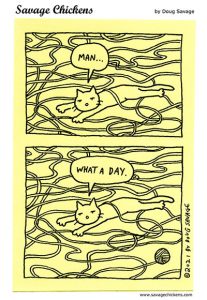
www.savagechickens.com
THE BOTTOM LINE: Most horses with loose stools are not very sick, it’s just that their manure isn’t formed the way it’s supposed to be formed. Since there’s no obvious cause, if you want to do something about it, you’re often stuck with a process of trial and error, hoping that something works. Frankly, if you’re horse looks healthy but his manure is a little wet, it can be a little crazy-making. But you’ll probably get it figured out eventually. And he won’t be bothered in the least.
OH, JUST ONE MORE, FOR FUN: A little boy walking down a country lane ran into a man pushing a wheelbarrow load of horse manure. The little boys asked the man what he’s going to do with all of that horse poop. The man says, “I’m taking it home to put on my strawberries.” To which the little boy replies, “I like cream and sugar on mine.”





